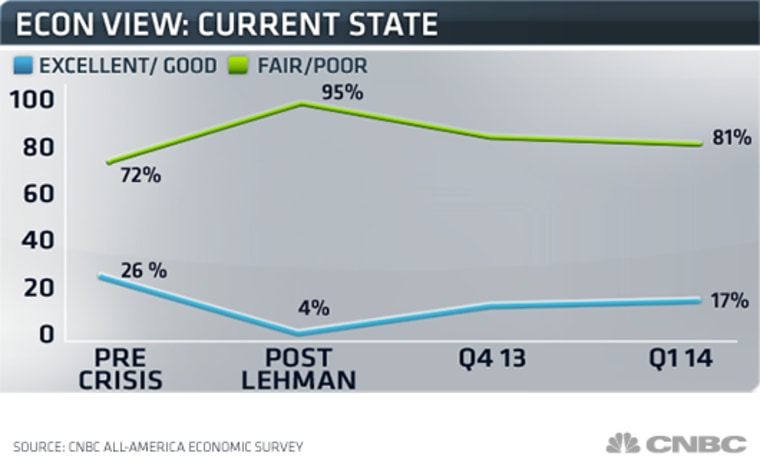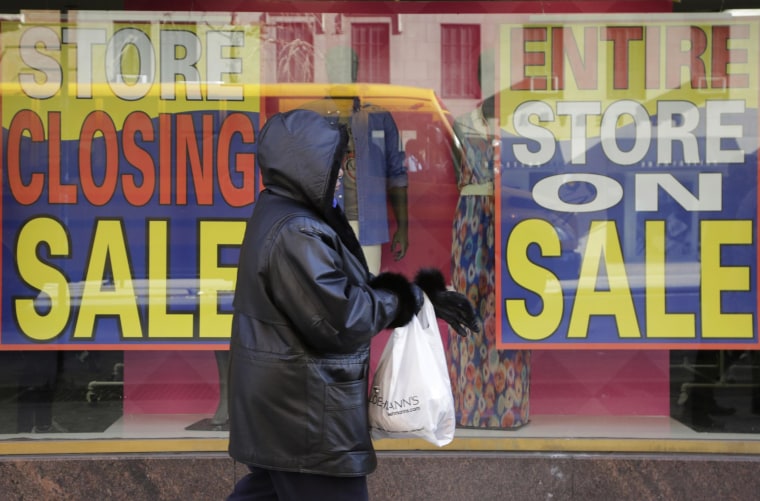Despite two quarters of strong growth ending 2013, Americans' views on the economy remain depressed with only the slightest improvement compared to a year ago, according to the CNBC All-America Economic Survey.
More than 80 percent view the economy as just fair or poor, almost unchanged from the fourth-quarter survey. While that represents an improvement from the depth of the financial crisis in 2008, when 95 percent of Americans were downbeat on the economy, it's still a long way from the precrisis level of 72 percent.
Just 17 percent of Americans view the economy as good or excellent. In 2007, before the Great Recession, it was 26 percent.

The survey found somewhat better news when it comes to economic expectations. In the latest survey, 29 percent see the economy improving in the next year, up from 26 percent in the fourth quarter. However, the percentage believing the economy will worsen remains at 30 percent.
Behind these views are relatively muted expectations for increases in wages and housing prices. Americans see their wages gaining 2.2 percent in the next year, down from 3.3 percent in the fourth quarter survey.
Housing prices are seen rising 2 percent in the next year, about even with the prior expectations. But that represents a considerable improvement from June 2011, when American on average believed their home prices would fall 1.6 percent.
The survey of 800 Americans across the country was conducted March 13-16 by Hart-McInturff, Democratic and Republican pollsters. It had a margin of error of 3.5 percentage points.
Two political themes are evident in the data: First, views of Republicans remain downbeat. Just 14 percent believe the economy will improve in the next year, unchanged from last year. But views of Democrats have also taken a step down. A year ago, 53 percent of Democrats thought the economy would improve. In the current survey, that's fallen to 44 percent.
Wealth gap returns
For better or for worse, the data show that a pre-crisis gap between rich and poor is returning. Before the recession, those with incomes above $100,000 were far more upbeat on the economy than those with incomes below $30,000. The survey showed a 25-point gap between the two groups.
The gap fell to just 6 points in 2012, suggesting that the economic downturn and weak recovery had strong impacts on both the wealthy and the poor. But the gap is returning slowly, rising to 12 points in the current survey. That could be a sign of better wage, home price or stock gains experienced by wealthy Americans.
Around 54 percent of those with more than $50,000 in the market see this as a good time to invest, unchanged from last year. Despite a 20 percent rise in stocks in the past year, just 28 percent of those without stocks think this is a good time to invest, up from 25 percent a year ago.
Those with less than $50,000 in the market actually became more pessimistic on stocks, with only 43 percent saying it's a good time to invest, down from 52 percent a year.
The survey also found that despite massive media coverage, bitcoin ranks as the least well-known major business stories, with just 48 percent having heard of it. Just 4 percent of the public see bitcoin as a practical alternative to the dollar, 25 percent say it could be one day and 40 percent say it will never happen.
In other findings:
Americans by 2 to 1 favor increasing the minimum wage to $10.10, with a big jump in those who strongly favor the move.
By 47-40 percent, Americans believe it is more significant that raising the minimum wage will potentially reduce poverty than it will potentially cost jobs.
Support for Obamacare grew 5 points compared to the December survey, but it remains at just 31 percent, with 14 percent neutral and 44 percent with negative views.
Fifty-six percent of Americans wouldn't mind an establishment selling marijuana in their town, but only 48 percent support one opening in their neighborhood. Only around a third of Americans would invest or work in a business that sells or grows pot.
